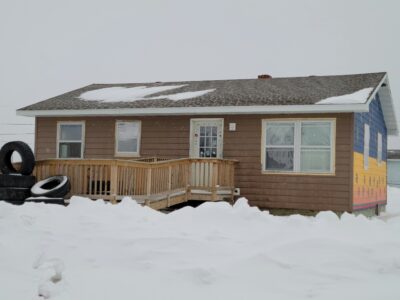Energy Crisis in White Earth
Current Energy Problems
White Earth Reservation suffers from inefficient energy and housing infrastructure resulting in unaffordable energy that costs 45% more of an individual’s income on energy bills compared to white (non-Hispanic) households. Inadequate electric and heating systems are not only insufficient, they’re also more expensive. Exorbitant household energy bills stack up causing the constant “shut-off/turn-on” cycle from utility providers adding further hardship to families along with the expense of additional fees. Most of the homes in White Earth are heated with electric baseboard heaters and cooled with window air conditioners. When this is coupled with poorly built homes it creates an energy burden that is debilitating. Many of the small, 2-bedroom homes on the reservation cost nearly $1000 a month to heat in the winter.
NZN knows the future of White Earth Reservation energy production must be renewable green energy, but this energy is only as strong as its’ final destination. Most of the energy that is produced in the world will end up either in a building or in a vehicle. It is logical that the final destination of green energy is just as important as its production. A building needs to be energy efficient to reap the true rewards of renewable energy. It doesn’t make much sense to send power created by the sun or wind to a building that leaks it right back into the world. The systems and construction methods to build Net-Zero homes will take full advantage of community based renewable energy. The building system is so efficient that all heating, cooling, and electricity costs are zeroed out.
Energy from Home Page
Energy inequality and energy inefficient homes contribute significantly to poverty on the White Earth Indian Reservation, as they create financial burdens, health risks, and limited economic opportunities for residents. Here’s how these factors are interconnected and contribute to poverty:

The snow on the roof is melting in the middle of the winter, because of poor insulation.
-
High Energy Costs: Energy inefficient homes require more energy to heat and cool, leading to higher utility bills. Many residents on the White Earth Reservation have limited financial resources, and these high energy costs can consume a significant portion of their income. As a result, households may struggle to meet other basic needs like food, healthcare, and education.
-
Limited Access to Clean Energy: Energy inequality often means that some residents have access to clean and efficient energy sources, while others rely on more expensive and less efficient options like propane or electric resistance heating. Those with limited access to clean energy face a double burden of higher costs and environmental impacts.
-
Health Risks: Energy inefficient homes may lack proper insulation, heating, or ventilation, which can lead to indoor air quality issues and health problems like respiratory illnesses. Healthcare costs associated with these conditions can further strain household budgets.
-
Economic Instability: High energy costs can lead to economic instability, making it challenging for residents to save money, invest in education, or start businesses. This perpetuates the cycle of poverty as individuals and families have limited resources to improve their financial situation.
-
Housing Instability: Energy inefficient homes can be more difficult to maintain, leading to increased housing instability. Residents may be forced to move frequently due to housing quality issues, which can disrupt employment, education, and community connections.
-
Environmental Impact: In cases where energy sources are unsustainable or rely on fossil fuels, energy inequality contributes to environmental degradation. This can have long-term consequences for both the environment and the health of the community.
White Earth Reservation suffers from inefficient energy and housing infrastructure resulting in unaffordable energy that costs 45% more of an individual’s income on energy bills compared to white (non-Hispanic) households. Inadequate electric and heating systems are not only insufficient, they’re also more expensive. Exorbitant household energy bills stack up causing the constant “shut-off/turn-on” cycle from utility providers adding further hardship to families along with the expense of additional fees. Many of the tribally owned homes on the White Earth Reservation are heated with electric baseboard heaters and cooled with window air conditioners. When this is coupled with poorly built homes it creates an energy burden that is debilitating. Many of the small, 2-bedroom homes on the reservation cost nearly $1000 a month to heat in the winter.
Impacts of the Energy Crisis
The Anishinabeg deserve safe, healthy, and energy efficient houses to live in. Too many families on the Reservation live in survival mode. There is no reason or excuse for so many to be homeless, near-homeless, overcrowded or live in mold-infested, dilapidated houses that cost nearly 50% of their annual incomes to heat, cool, and power. There are viable solutions to overcome structural poverty and climate change and the solutions lie within the Community itself.
Energy inequality and energy inefficient homes contribute significantly to poverty on the White Earth Reservation, as they create financial burdens, health risks, and limited economic opportunities for residents. Here’s how these factors are interconnected and contribute to poverty:
-
High Energy Costs: Energy inefficient homes require more energy to heat and cool, leading to higher utility bills. Many residents on the White Earth Reservation have limited financial resources, and these high energy costs can consume a significant portion of their income. As a result, households may struggle to meet other basic needs like food, healthcare, and education.
-
Limited Access to Clean Energy: Energy inequality often means that some residents have access to clean and efficient energy sources, while others rely on more expensive and less efficient options like propane or electric resistance heating. Those with limited access to clean energy face a double burden of higher costs and environmental impacts.
-
Health Risks: Energy inefficient homes may lack proper insulation, heating, or ventilation, which can lead to indoor air quality issues and health problems like respiratory illnesses. Healthcare costs associated with these conditions can further strain household budgets.
-
Economic Instability: High energy costs can lead to economic instability, making it challenging for residents to save money, invest in education, or start businesses. This perpetuates the cycle of poverty as individuals and families have limited resources to improve their financial situation.
-
Housing Instability: Energy inefficient homes can be more difficult to maintain, leading to increased housing instability. Residents may be forced to move frequently due to housing quality issues, which can disrupt employment, education, and community connections.
-
Environmental Impact: In cases where energy sources are unsustainable or rely on fossil fuels, energy inequality contributes to environmental degradation. This can have long-term consequences for both the environment and the health of the community.
Net Zero Duplex Homes
 There are very few options for home ownership on the reservation. We plan to build 40 Net Zero duplex homes and sell them at cost with low interest rate loans. These homes will have no heating, cooling, or electric bills. The adjoining rental unit, will house another family on the reservation and their payment will help to offset the mortgage.
There are very few options for home ownership on the reservation. We plan to build 40 Net Zero duplex homes and sell them at cost with low interest rate loans. These homes will have no heating, cooling, or electric bills. The adjoining rental unit, will house another family on the reservation and their payment will help to offset the mortgage.
5MW Community Solar Garden
 The 5MW community solar garden will heat, cool, and power every building in the sustainable community. The excess power will help to power an additional 700 homes on the reservation.
The 5MW community solar garden will heat, cool, and power every building in the sustainable community. The excess power will help to power an additional 700 homes on the reservation.
100+ Acre Farming Co-op
 The sustainable community will have a 100+ acres farming co-op. It will have vegetable gardens, apple orchards, fruit bushes, chicken coops, an apiary, mushroom farms, greenhouses, and aquaponics.
The sustainable community will have a 100+ acres farming co-op. It will have vegetable gardens, apple orchards, fruit bushes, chicken coops, an apiary, mushroom farms, greenhouses, and aquaponics.
Community Kitchen and Event Center

Our community kitchen and event center will be have a dual license from the MN Department of Health and the FDA. This will allow for food local food processing for the elder and school meal program. Additionally, local entrepreneurs will be able to test their food products with little start up costs.
Intergenerational Interactions

Net Zero Nations will build an combination assisted living center and a daycare. There will be a center kitchen and dining center with an assisted living wing and a daycare wing. This will allow for interactions between our elders and our next generation.
Who Are We Working For?
We are a large group of people who powered movement fighting for a green and peaceful future for your land, forest, oceans, foods, climate and pass the green earth to our children. Each one of us can make small changes in our lives, but together we can change the world. Sed posuere consectetur est at lobortis. Duis mollis, est non commodo luctus, nisi erat porttitor ligula, eget lacinia odio sem nec elit. Fusce dapibus, tellus ac cursus commodo.
The only way to make this happen is to make action!
Praesent commodo cursus magna, vel scelerisque nislet.

